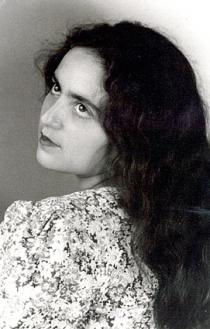My uncle Isaac and his niece at his home in Kiev in the 1980s. It is an amateur photograph.
In 1946 my uncle Isaac came to Orenburg region to take us to Kiev. My grandmother Malka lived with her son Mikhail and his wife in Kiev. We moved in with uncle Isaac. He lived in a two-storied wooden house in the suburbs of Kiev. Isaac had three children. The owner of this house was an 80 years old man. He bought it in 1885 when he was a bread dealer. We were renting one room on the 2nd floor facing the street with a streetcar rail track and a small kitchen with a big stove that occupied most of the space. There was a small window in the kitchen. There was a veranda at the entrance to our apartment. There was a primus stove and buckets with water on the veranda. It was always cold and damp in the apartment. The stove didn't help.
I was responsible for fetching water from our neighbor's well. I carried two buckets on the shoulder-yoke. I was short and the buckets were big and heavy. My uncle held a high official post and provided well for his family. He was Deputy director of a big office, involved in sales of paper. His wife was a typist in a store. My brother and I went to school. I became a pioneer.
We lived in this family for a year and then Isaac's wife took my brother and me back to the children's home. I lived there until 1948. We were well fed in Isaac's family, but in the children's home we understood what it was like to be hungry.
Uncle Isaac had a great influence on me. He was so shocked by extermination of Jews in Kiev and other locations during Holocaust that he decided to dedicate his life to saving the memory and culture of these people. This occurred to him in one of his business trips to a small town near Kiev. He came into the yard of a local farmer (he wasn't a Jew) and froze: the old man was sitting on the bench in the yard cutting tiny pieces from the scroll of Torah to upholster the inside of a big box with them. My uncle forgot all about why he came to this man and jumped on this man yelling at him "What are you doing?" He explained to the old man about the scroll and the man gave all pieces to my uncle. My uncle gave the Torah to the synagogue in Kiev and they buried it according to the tradition because it was damaged.
At that moment Isaac understood that it was his duty to find and buy such miraculously preserved pieces from people and save them in the memory of those who perished during the Holocaust. He began to collect pieces of Jewish art. When he saw a book of prayers or a Jewish picture that was sold at the market he asked the vendors where they got those. They usually replied "There was Jewish family living in our apartment before the war. They perished and this is what was left". In many years my uncle collected many pictures, engravings, dishes, mezuzas, etc. He often went to small Ukrainian towns on business and brought many pieces from there. He kept and restored them. Every piece had a history of its own and my uncle remembered every single story. This became the essence of his life. His apartment was full of these pieces. He was writing a book. It was entitled 'Collection" and contained description of many pieces from his collection.
My uncle's wife didn't support her husband. She made scenes after he brought every new piece into their apartment and his daughters was always mad that her father was buying junk instead buying new clothes for her. My aunt understood how dangerous it was to keep such collection at the height of anti-Semitism (my uncle started his collection in 1948 at the very height of anti-Semitic campaign), when a person could be arrested even if the authorities found a little book in Yiddish at home. She was afraid for her husband and children. Besides, she was a very cleanly lady, and all these pieces were very dusty and she had to spend her time trying to clean them. My uncle was hoping that his children would support him, but none of them took any interest in them. He was alone with his hobby.
New In the middle of 1960s my uncle was summoned to the KB office several times. He understood that he might be arrested and he stopped to collect things openly. However, these calls had nothing to do with his collection. He was called to the KGB office because they had found his phone number in one of their suspects' notebook. This suspect was charged for theft, but my uncle couldn't even remember his name at first. However, he got frightened for his family. It was the time when collection of the Jewish cult pieces could lead to no good, because even for things of less importance people could vanish in Stalin's camps and prisons.
Isaac was a member of the Communist Party, but he knew what the Soviet power was like and this caused him a lot of suffering. He was writing a book, but he was afraid that somebody would read this book. He was writing it avoiding direct language. He understood that if he was going to be arrested and the authorities got this book he would be charged additionally for writing what he thought. (The manuscript of this book has been preserved. The book is prepared for publication in the Institute of Judaism in Kiev).









